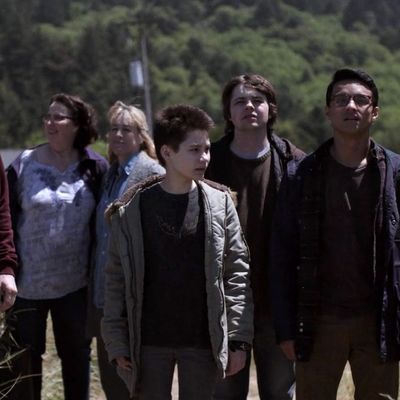
The full promise of The OA finally comes to fruition in the sixth episode, which returns to our original dimension to follow the angel’s abandoned flock on a journey across America. There are strong shades of The Leftovers at work in the saga of these desperate, grieving individuals who aren’t fully able to grasp the tenure of the supernatural event that’s given them so much heartbreak. At least until we get to the final scene, which delivers a deus ex machina for the ages.
But until then, “Mirror Mirror” works wonders as a quiet drama of broken wills, as all the hunches the dance crew followed in the last episode have become their downfall. BBA refuses to go to the other side until she can say goodbye to her dying uncle, much to Steve’s impatience, and we can see just how acutely their collected sorrow over OA’s passing has affected their outlook on life. We’ve always known Steve as the bullheaded type (every ensemble story needs at least one of them), but his increasing desperation to leave his universe behind gives us a peek at the scared little boy who lives within him. Patrick Gibson gets to lean further into the physicality of his performance in this episode, stripping down and shrieking with delight when he encounters the ocean, even if he occasionally trips over dialogue that’s too self-consciously tough-guy. Steve’s secret plan to somehow piggyback off of BBA’s jump is emblematic of his character: emotionally transparent, poorly thought out, single-minded, and doomed.
BBA, meanwhile, is confronting her own mortality in a devastating way. As she proved to be on The Office, Phyllis Smith is this show’s secret weapon. She always knows how to lean just enough into the most pathetic elements of her characters. Here, we can believe that BBA is so lonely and impressionable that she’d allow herself to be swept along on the kids’ supernatural wild-goose chase. Because she is an adult, her dissociative visions cause her to question her own sanity, whereas any of these young folks would be ecstatic to receive confirmation of what lies beyond their world. And yet because she is the only adult, she’s also the prime suspect when Buck’s mom reports the children as missing, and she gets depicted in the media as a sinister cult leader instead of a caring, somewhat dotty, middle-aged woman.
Of course, BBA was named in the TV prophesy that concluded episode three, so the crew needs her to just psyche herself up and jump — but she’s correctly deduced that leaving one dimension means death. In this way The OA has taken the long way back around to a recognizable human emotion. The gathering at her uncle’s beachside house is a moving balance of pathos and creeping dread, with family memories sprinkled in between her cousin’s growing suspicion of her true intentions and Jesse’s clearly accelerating depression. When Jesse turns up dead on the beach the next morning, overdosed on BBA’s uncle’s painkillers, it’s a devastating turn of events that — unlike last season’s shock-factor developments — nevertheless makes sense for the character. Angie’s line about the group being more comfortable with him “in the margins” rings very true to the ways depression can work even within a social setting.
The group’s best-laid plans fall apart quickly after Jesse’s death. They abandon their already-quixotic attempt to outrun the cops all the way to the Treasure Island sanitarium once Steve, who finally seems to be suffering some degree of culpability for his influence on their predicament, has a breakdown and flees on his own. All attempts to perform the movements as healing chants fail. It seems they might finally have to face down the fact that they’re now living in a hopelessly irreparable reality… until Riz Ahmed’s FBI agent/guardian angel turns up at the 11th hour to impart some cryptic nonsense that will finally save them. So it seems The OA is now back to business as usual. What had briefly been two distinctly different shows will soon merge into one tentacled entity.
Stray Thoughts
• It’s not surprising that Andrew Haigh directed both of the episodes set in the first dimension: they’re both infused with a particular air of melancholy that suits his work quite well. This one in particular has a lot of Lean on Pete in it.
• The performances in this episode are all-around stellar, including Brendan Meyer’s (final?) turn as Jesse, giving a bedside visitation that also doubles as a triple eulogy. If these kids have second-dimension counterparts, it will be fascinating to see how they alter their performances to match.
• Also, this is the first time the bond between OA’s motley crew didn’t feel forced by the script. Their relief as they rode in the truck and their playfulness on the beach go a long way toward establishing their co-dependence, and these scenes are also arguments in favor of slowing down this breakneck narrative to enjoy the scenery every once in a while.
• Elias, the FBI guy, is strongly hinting that he serves the role of OA’s protector in this dimension that Kareem serves in the other one. Except Elias is here willingly and Kareem is not yet aware of his role. If they’re mirror images of each other, they’d be the only ones so far who are not literally the same person.

